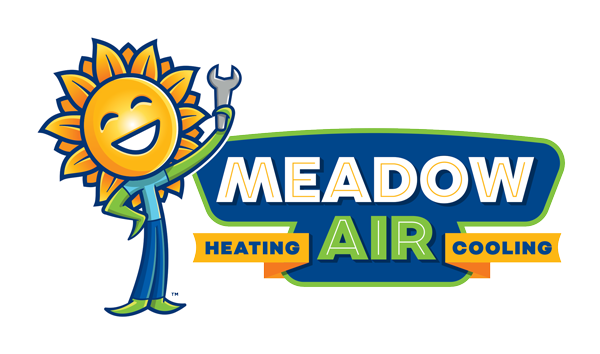Why Does My Furnace Keep Turning Off
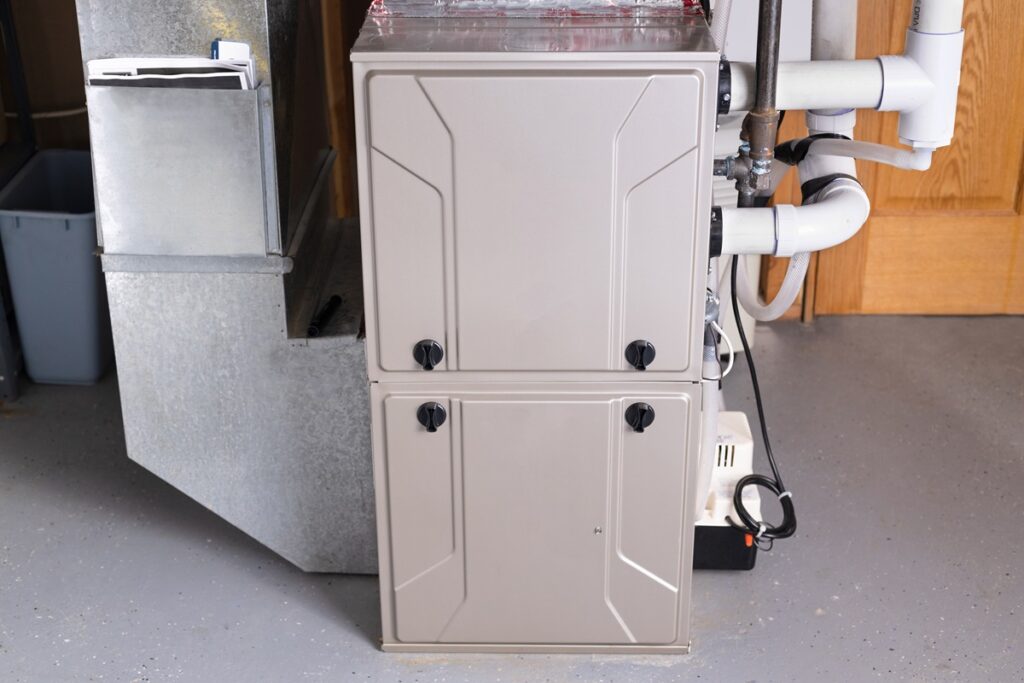
When your furnace repeatedly shuts off and on, your unit won’t be able to adequately heat your home. This can be extremely uncomfortable, especially during the winter months.
There are a number of reasons why your furnace keeps turning off. So let us look at some of the most common culprits.
| Key Takeaways: Why Does My Furnace Keep Turning Off? |
|---|
| ℹ️ Dirty Air Filter: A clogged filter restricts airflow, causing the furnace to overheat and shut off. Replace it regularly. |
| ℹ️ Thermostat Issues: Incorrect settings, dead batteries, or poor placement can cause frequent cycling. Check and adjust as needed. |
| ℹ️ Flame Sensor Problems: A dirty or faulty flame sensor may prevent the furnace from staying on. Cleaning or replacement might be required. |
| ℹ️ Blocked Exhaust Flue: Obstructions like debris or nests can trigger safety shut-offs. Regular inspections help prevent this. |
| ℹ️ Oversized Furnace: If your furnace is too large for your home, it may short cycle, leading to inefficiency and wear. |
| ℹ️ Professional Help: If troubleshooting doesn’t resolve the issue, an HVAC technician can diagnose and fix complex problems. |
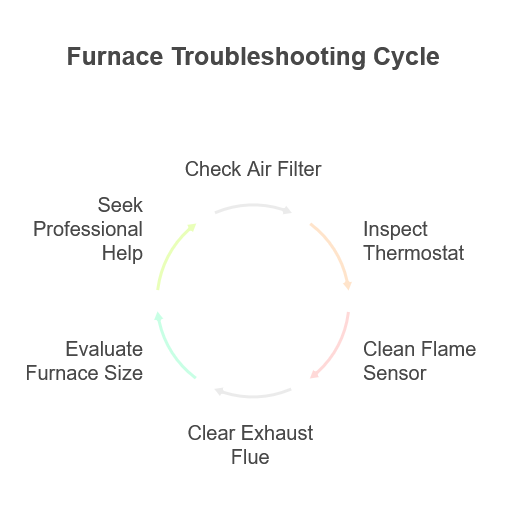
Faulty Thermostat
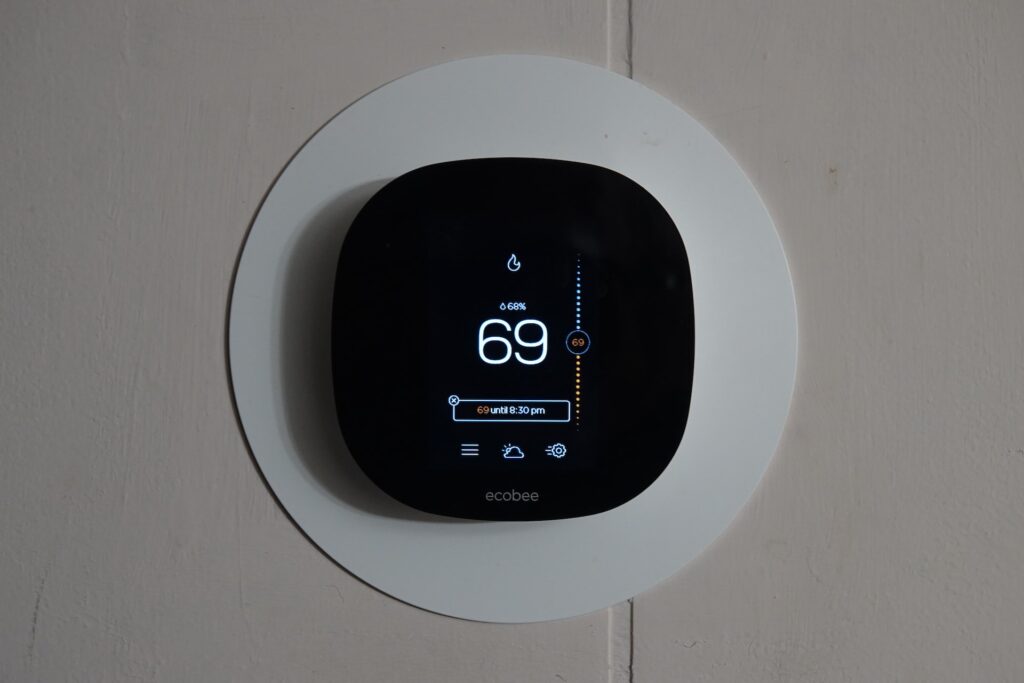
ℹ️ Check the Temperature Setting. Make sure your thermostat is set to the right temperature. If it’s too low, the furnace may turn off sooner than expected. Adjust it to the correct setting and see if that solves the problem.
ℹ️ Incorrect Wiring: If you’ve recently moved or replaced your thermostat, incorrect wiring could be the issue. Check that all wires are properly connected and not crossed. If you’re unsure, consider consulting an HVAC professional.
ℹ️ Poor Placement: If your thermostat is placed near a heat source, like a space heater, a sunny window, or a warm appliance, it may think your home is warmer than it actually is. This can cause the furnace to shut off too soon. If possible, move the thermostat to a more neutral location for a more accurate temperature reading.
Dirty Air Filter
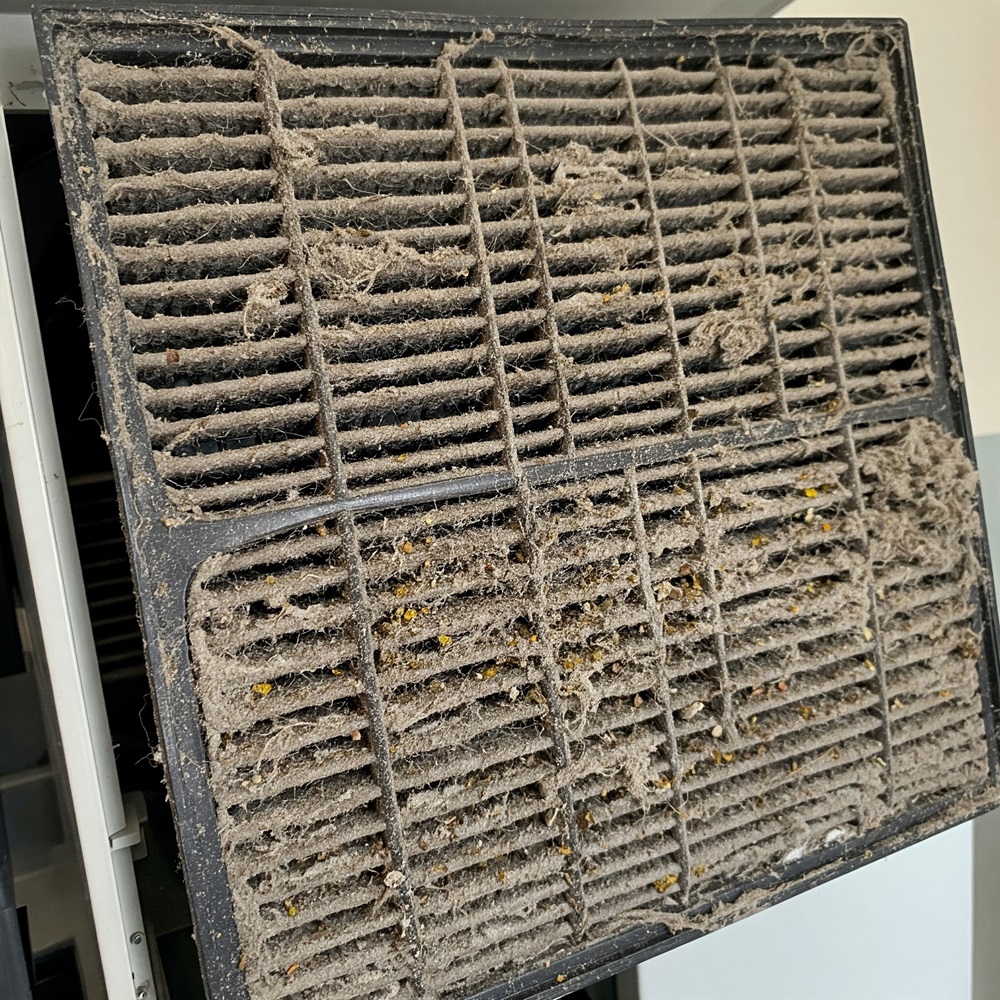
Your furnace’s air filter is essential for maintaining good airflow and keeping your heating system running efficiently. It traps dust, dirt, and other pollutants, preventing them from building up in your ductwork and affecting performance.
Over time, the filter collects so much debris that air struggles to pass through. When this happens, your furnace has to work harder to circulate warm air, often causing it to turn on and off frequently as it struggles to maintain a steady temperature.
Solution: Replace your air filter regularly. A good rule of thumb is to change it once a month or as recommended by your furnace manufacturer. Keeping your filter clean improves airflow, helps your furnace run efficiently, and enhances the air quality in your home.
Faulty Ignition System
Your furnace’s ignition system controls the gas supply, allowing it to turn on and off as needed. If your furnace keeps shutting down unexpectedly, the issue could be within this system.
Troubleshooting:
✅ Check the power supply to ensure it’s still connected.
✅ Inspect the wiring for any loose connections.
✅ Check the fuse and replace it if necessary.
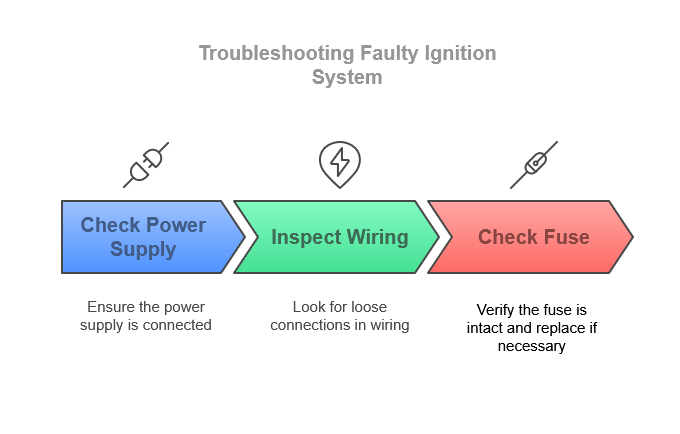
If your furnace continues turning off, a bad ignition switch or another ignition system component may need replacing. At this point, it’s best to call an HVAC professional.
Dirty or Corroded Flame Sensor
A flame sensor detects if the furnace’s burner is lit. If dirt or corrosion accumulates on the sensor, it may fail to detect the flame properly. As a safety measure, the furnace will shut down to prevent unburned gas from accumulating.
Signs & Solutions:
- The furnace ignites briefly and then shuts off repeatedly.
- A professional HVAC technician can clean or replace the flame sensor to resolve this issue.
- Regular maintenance and cleaning can help prevent dirt or corrosion buildup over time.
Broken (or Malfunctioning) Flame Sensor
Although dirt and corrosion are the most common issues, a flame sensor can also be broken or defective. If this component is truly broken (rather than just dirty), you may notice the furnace shutting off immediately after turning on.
Solution: If you suspect a broken flame sensor—beyond just dirt or corrosion—a technician can confirm it needs replacing.
Damaged Blower Motor
The blower motor distributes heated air through your home. It’s typically mounted on top of the furnace or inside it. If it stops working correctly, your furnace may overheat, causing it to shut down to prevent damage.
Signs of a Damaged Blower Motor:
❌ Loud noises coming from the furnace.
❌ A burning smell.
If you notice these signs, call an expert to replace or repair the blower motor before it leads to bigger issues.
Damaged Heat Exchanger
A heat exchanger circulates hot air throughout your home. If it’s damaged, it cannot do its job efficiently and will cause your furnace to use more energy than necessary—often resulting in higher utility bills and frequent shutoffs due to overheating.
Symptoms:
❌ Your home is cooler than it should be
❌ An unexpected increase in energy bills.
❌ Furnace shutting down frequently to avoid damage.
If you suspect a damaged heat exchanger, call a professional immediately for an inspection.
Blocked Exhaust Flue
Your furnace’s exhaust flue removes harmful gases (like carbon monoxide) from your home. If the flue is blocked—by debris, animal nests, or other obstructions—the furnace may shut down as a safety feature to prevent hazardous backflow.
Prevention & Fixes:
✅Have the exhaust flue inspected and cleaned regularly, especially in the fall before heating season begins.
✅ If you notice frequent shutdowns, call an HVAC professional to check for blockages.
An Oversized Furnace (Short Cycling)
If you’ve had a new furnace installed in your home and it keeps turning off, it’s possible that the furnace is too large for the house. When a furnace is too large, it can heat your home too quickly and then shut off prematurely—a process known as short cycling.
Why It’s a Problem:
❌ Reduced comfort: Your home may experience rapid temperature swings because the furnace doesn’t run long enough to circulate heat evenly.
❌ Increased wear: Frequent starts and stops put extra strain on the system, leading to more frequent repairs and a shorter lifespan.
❌ Higher energy bills: Although it seems counterintuitive, short cycling wastes energy due to multiple start-up sequences.
Unfortunately, the only true fix is to install a smaller furnace or one more appropriately sized for your home. If you’re not sure whether your furnace is too large, call an HVAC professional for an inspection.
Blocked Vents
If your vents are blocked—by furniture, rugs, or other objects—the furnace won’t be able to pull enough air into the system. This can cause overheating, poor indoor air quality, and an unpleasant stuffy feeling in your home.
Solution:
✅ Check each vent to make sure nothing is obstructing airflow.
✅ Remove any blockages or reposition furniture.
✅ If blockages aren’t easily removed, consult an HVAC professional.
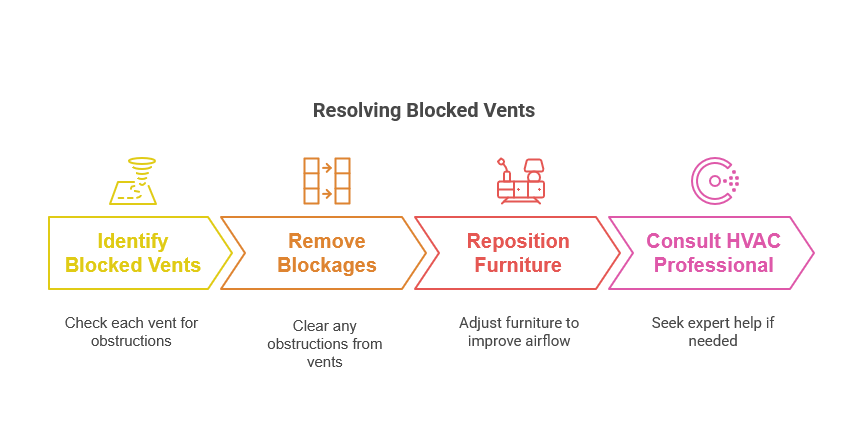
⚠️When Professional Intervention Is Crucial
- Flame Sensor Cleaning or Replacement. Handling the flame sensor involves delicate work. A professional can clean or replace it without damaging surrounding components.
- Electrical Issues.Dealing with loose wires, faulty switches, or high-voltage components can be dangerous. A certified technician ensures the work is done safely and correctly.
- Gas and Exhaust Concerns. From gas line repairs to blocked exhaust flues, these tasks require specific safety measures to avoid carbon monoxide or gas leaks.
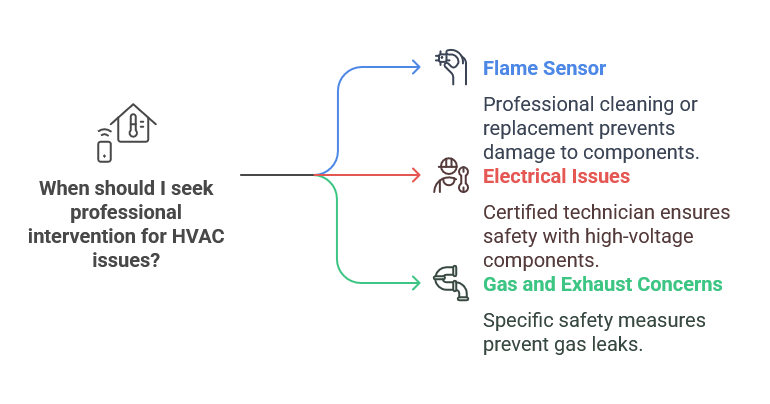
What Is a Furnace Cycle?
A furnace cycle is the process your heating system goes through to heat your home. It begins with air being pulled into the furnace from outside your home, which is then heated in the unit’s burners. Once it has been heated, it is distributed throughout the house via ductwork. The cycle repeats as long as you need heat.
How Long Should the Typical Furnace Cycle Last?
The duration varies based on:
- Home Size & Duct Efficiency: Bigger or older homes may require longer cycles to circulate warmth adequately.
- Outside Temperature: In colder conditions, furnaces run longer to maintain the desired indoor temperature.
- Thermostat Accuracy: An older or poorly calibrated thermostat can lead to irregular cycling times.
How Can I Tell When My Furnace Needs Repairs?
If you’re having problems with your furnace, it can be difficult to know whether the issue is a simple fix or something that needs to be repaired by a professional. There are some telltale signs of a problem that you can look for, such as:
❌ Your furnace is making unusual noises or rattling;
❌ Your thermostat is not working properly;
❌ Your furnace isn’t heating your home properly, even though you’ve adjusted the thermostat settings;
❌ The pilot light keeps going out;
❌ The furnace is not running at all;
❌ You notice a burning smell or strange odors;
❌ You notice that your furnace is leaking water onto the floor or dripping water into a pan.
If you notice any of these issues, call a professional. Prompt diagnosis and repair ensure you’re not left without heat when you need it.
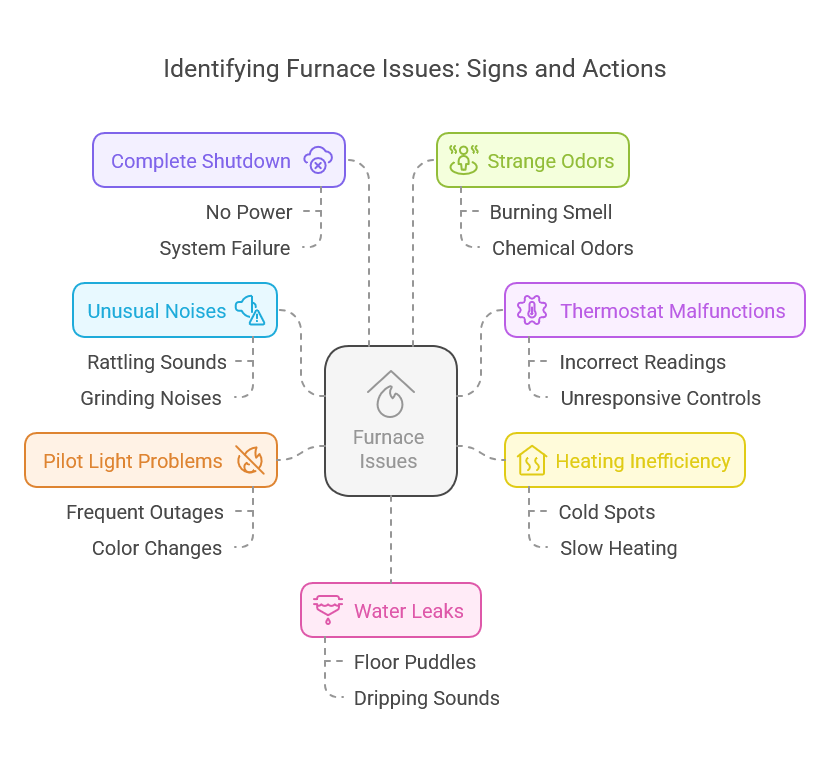
Preventive Measures to Avoid Future Issues
While furnaces inevitably need periodic attention, you can dramatically reduce problems and unexpected shutdowns by following these preventive tips:
ℹ️ Schedule Regular Maintenance. Arrange yearly tune-ups with an HVAC technician. A professional will inspect and clean critical components, check for signs of wear, and make adjustments to keep your furnace in top condition.
ℹ️ Change Air Filters Frequently. Dirty filters are the number one cause of short cycling. Check your filter monthly during heating season and replace it according to your HVAC technician’s advice or the manufacturer’s guidelines.
ℹ️ Keep Vents Clear. Make sure that vents, registers, and return air grilles aren’t blocked by furniture, curtains, or other objects. Good airflow reduces strain on the blower and helps maintain even temperatures.
ℹ️ Monitor Thermostat Location. Keep thermostats away from direct sunlight, heating appliances, or cold drafts. This ensures accurate temperature readings and prevents the furnace from turning off too soon.
ℹ️ Check Exhaust Flue & Outdoor Intake. At least once a season, visually inspect the outdoor vents (if safely accessible) for debris, leaves, or bird nests. Blocked vents can lead to inefficient operation or safety hazards.
ℹ️ Clean Around the Furnace. Clear the area around your furnace in the basement or utility room. Keep boxes, laundry, and flammable materials away to reduce fire risk and allow proper airflow.
ℹ️ Consider Upgrades. If your furnace is older, having frequent breakdowns, or is oversized/undersized, consult with an HVAC professional about replacement options. Modern furnaces are more energy-efficient and reliable.
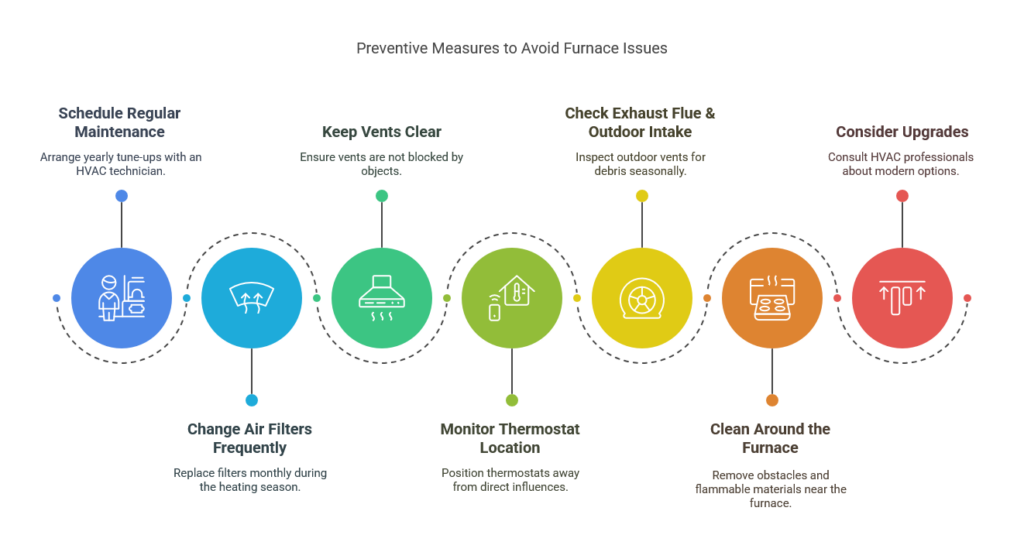
By adopting these preventive habits, you’ll minimize the likelihood of costly breakdowns and extend the life of your heating system
Final Remarks
Repeated furnace shutdowns are a clear sign that something’s not right. It could be a minor issue like a clogged filter, or it might point to a serious problem such as a cracked heat exchanger or failing electrical component. The safest, most cost-effective approach is to call a trusted HVAC technician for a thorough inspection and repair.
Remember, proactive maintenance is your best defense against furnace troubles. Regular tune-ups, timely filter replacements, and simple checks around the system can keep your furnace running efficiently and safely—ensuring your home stays warm and comfortable throughout the heating season.
Sources & References
- Energy.gov – Furnace Maintenance & Common Issues
- ASHRAE – HVAC Guidelines & Best Practices
- EPA – Indoor Air Quality & HVAC Systems
- Carrier – Furnace Troubleshooting Guide
- Lennox – Furnace Maintenance & Troubleshooting
- Trane – Furnace Troubleshooting & Care
- NFPA – Furnace Safety Tips
- OSHA – HVAC Safety Guidelines
